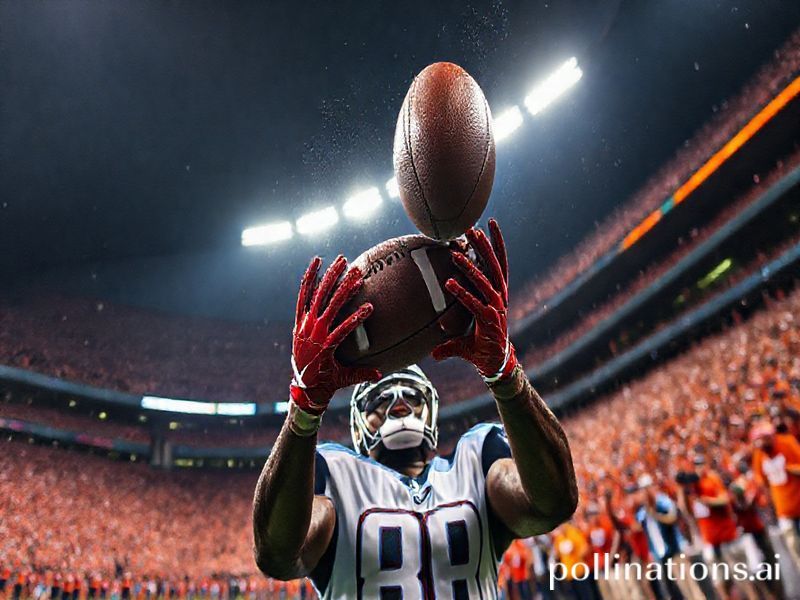jauan jennings
Jauan Jennings and the Weaponized Underdog: How a Third-Stringer Became a Geopolitical Mirror
PARIS—On paper, Jauan Jennings is a 6’3″ wide receiver for the San Francisco 49ers who was drafted in the seventh round, cut twice, and now moonlights as a special-teams gunner and occasional red-zone nuisance. In practice, he has become a walking, trash-talking allegory for the multipolar disorder we politely call “the 2020s.” While diplomats in Geneva debate whether the world is unipolar, bipolar, or merely bipolar-adjacent, Jennings is out here embodying the new doctrine: marginal actors with maximalist attitudes, thriving on chaos nobody bothered to regulate.
Consider Sunday’s NFC Championship, when Jennings—listed third on the depth chart behind two guys who own more Instagram followers than some EU member states have citizens—hauled in a touchdown, delivered a two-point conversion, and then spent the next media cycle explaining why he’d spent the entire game telling cornerbacks their life choices were “mid.” The clip went viral from Lagos to Lahore, subtitled in seventeen languages, proof that the lingua franca of 2024 isn’t English but pure, uncut spite.
Global audiences recognized the type immediately. In Seoul, political science majors compared Jennings to the People’s Liberation Army’s “little blue men” in the South China Sea—technically non-state actors who still manage to move borders while the superpowers pretend to be shocked. In Berlin, interns at the Foreign Office swapped Jennings memes with captions like “When you’re the IMF and Greece suddenly discovers leverage.” The joke, of course, is that leverage is no longer the exclusive property of the powerful; it’s a downloadable patch, available to anyone willing to be insufferable in front of a camera.
The NFL, never one to miss a monetization opportunity, is already shipping “Jennings Energy” merch to secondary markets. A pop-up store in Mexico City sold out of T-shirts that read “Margin of Error: Zero” in under an hour; the kids wearing them have never watched American football but understand the sentiment from negotiating daily with their own governments. Meanwhile, Alibaba’s algorithmic overlords report a 300 percent spike in counterfeit Jennings jerseys in Guangdong province, stitched by workers who will never afford a ticket to Levi’s Stadium but can recite his college stats like a catechism. Somewhere, a Foxconn middle manager is calculating whether to rebrand the entire assembly line as “Just-In-Time Underdog™.”
Back in Washington, think-tankers have begun citing Jennings in white papers about “asymmetric cultural warfare.” The irony is thicker than a Kansas City barbecue: the same Beltway crowd that spent decades exporting American football as soft power now finds the sport re-imported as a how-to manual for twenty-first-century insurgency. One particularly joyless analyst at CSIS even proposed a “Jennings Doctrine”—the notion that credibility now accrues not to institutions but to whoever can meme their grievance fastest. He delivered the briefing in a navy suit that cost more than Jennings makes in a game check, then asked the interns to Venmo him for “research pizza.”
And what of the man himself? Jennings spent his bye week streaming Call of Duty and laughing at trade-war jokes in his chat. When asked about his newfound status as a geopolitical Rorschach test, he shrugged: “I just like scoring on people who wrote me off.” Somewhere in Tehran, a sanctions-battered startup founder pumped her fist; in Kyiv, a soldier on trench duty set his phone wallpaper to Jennings stiff-arming a Cowboys safety. They all recognize the same thing: power is now less about the size of your army and more about how convincingly you can claim the world never gave you a chance.
The 49ers play for the Lombardi Trophy in two weeks. If they win, Jennings will likely get a Disney documentary and a cereal box. If they lose, he’ll still be a folk hero—proof that in an era when supply chains and democracy both collapse on schedule, the only reliable constant is a third-stringer with a grudge and a platform. Either way, the planet keeps turning, the memes keep churning, and somewhere in Brussels a bureaucrat drafts a footnote citing “the Jennings variable” in next quarter’s risk assessment. History, it turns out, is written by the victors—then footnoted by the overlooked, subtitled in sarcasm, and monetized by the truly shameless.







